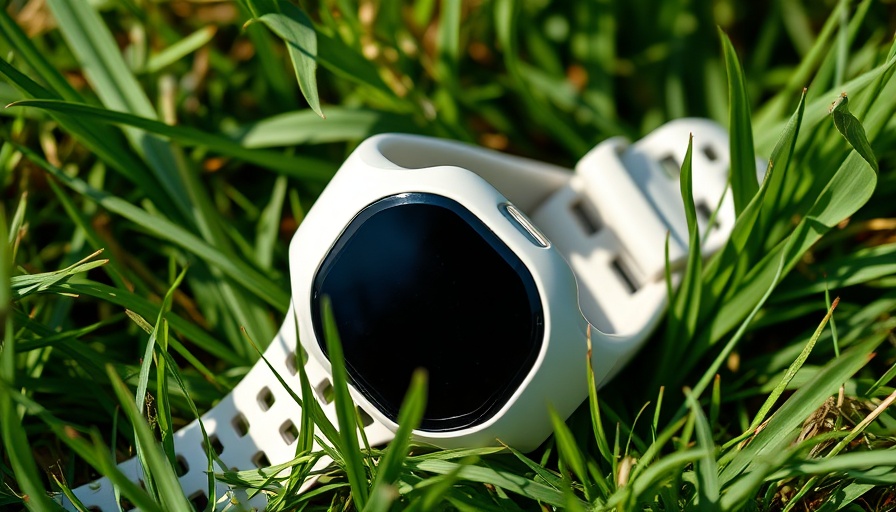
Understanding Fitness Trackers in Today's World
In our fast-paced, tech-driven society, fitness trackers have become an integral part of maintaining a healthy lifestyle. These devices not only quantify our daily movements but also provide insights into our overall wellbeing. However, as business professionals, it's essential to strike a balance between leveraging technology for fitness and maintaining a mindful approach to our health.
Historical Context and Background
The concept of fitness monitoring isn't new; for decades, professionals have relied on various means to track their wellbeing, from simple pedometers to sophisticated health monitoring systems. With the advent of fitness trackers, individuals can now obtain a wealth of data at their fingertips. However, the rise of wearable technology brings forward the question of how to use these insights responsibly.
Social Connection: The Value of Balancing Tech and Intuition
Fitness trackers can foster a sense of accountability when it comes to our health routines. But they can also lead to an obsession with numbers that detracts from the joy of movement. It's vital to recognize that while analytics are significant, they shouldn't overshadow our intrinsic motivations for staying active.
Future Predictions: Evolving Use of Health Tech
As technology continues to advance, so will our relationship with fitness trackers. Future iterations may integrate even more personalized functions based on unique lifestyle patterns. For instance, envision trackers that offer tailored advice based on stress levels, sleep habits, and daily productivity rhythms. This trend could revolutionize not only how we approach fitness but also our overall mental wellbeing.
Counterarguments: The Risks of Over-Reliance on Data
Despite the advantages of fitness trackers, significant pitfalls lurk beneath the surface. Critics argue that an over-reliance on data can lead to anxiety and dissatisfaction. When individuals scrutinize their performance metrics, they may foster a negative self-image, which counters the fundamental purpose of maintaining good health. Striking a balance between careful monitoring and listening to one's body is crucial.
Unique Benefits of Mindful Tracking
Mindful tracking encourages a holistic approach where individuals pay closer attention to how they feel rather than just the numbers on their screens. Understanding your body’s need for rest, nutrition, and mental clarity can lead to better decision-making regarding fitness. Using trackers as tools for motivation instead of strict measures of success can pave the way for sustainable emotional and physical health.
Practical Tips for Enhancing Your Fitness Journey
1. **Set Clear Intentions:** Before diving into tracking, clarify what you want to gain from it. Are you aiming for better fitness, improved mental health, or simply a more active lifestyle? Understanding your goals will guide how you utilize the data.
2. **Limit Screen Time:** Resist the urge to check your metrics constantly. Establish specific times to review your progress to prevent fixation on numbers. This allows you to appreciate your body's natural rhythms and maintain your enjoyment in physical activities.
3. **Engage in Reflective Practices:** Consider journaling your feelings and experiences alongside your tracking data. Reflecting can provide a perspective that numbers sometimes fail to capture, enhancing your overall journey.
Emotional and Human Interest Angle: Stories of Transformation
Real-life stories often resonate more than mere statistics. Numerous professionals have shared how embracing fitness tracking helped them become more aware of their bodies’ needs. For instance, one marketing manager revealed that tracking not only improved her physical health but also restored her mental clarity, allowing her to perform better at work while maintaining a satisfying personal life.
Common Misconceptions: Fitness Trackers Are Not Infallible
It's a common belief that tracking devices are perfect tools for fitness and health monitoring. However, inaccuracies can occur, leading to misguided conclusions. Understanding that these devices are helpful tools, but not absolute authorities, is essential in fostering a healthier mindset around fitness.
Conclusion: Embracing Balance in Fitness Tracking
While fitness trackers provide valuable insights into our physical activity, they should not overshadow our intrinsic motivation to stay active. Maintaining a balance between technology and a reflective, intuitive approach may just hold the key to a fulfilling fitness journey. As we continue to embrace health tech innovations, let’s remember to cherish the human experience behind our fitness journeys.
 Add Row
Add Row  Add
Add 




 Add Row
Add Row  Add
Add 

Write A Comment